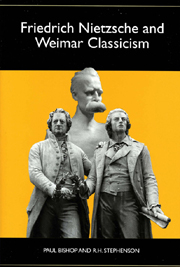Book contents
- Frontmatter
- Contents
- Dedication
- Acknowledgments
- A Note on Editions, Abbreviations, and Translations
- Introduction
- 1 Die Geburt der Tragödie and Weimar Classicism
- 2 The Formative Influence of Weimar Classicism in the Genesis of Zarathustra
- 3 The Aesthetic Gospel of Nietzsche's Zarathustra
- 4 From Leucippus to Cassirer: Toward a Genealogy of “Sincere Semblance”
- Appendix: The Composition of Zarathustra
- Bibliography
- Index
3 - The Aesthetic Gospel of Nietzsche's Zarathustra
Published online by Cambridge University Press: 05 February 2013
- Frontmatter
- Contents
- Dedication
- Acknowledgments
- A Note on Editions, Abbreviations, and Translations
- Introduction
- 1 Die Geburt der Tragödie and Weimar Classicism
- 2 The Formative Influence of Weimar Classicism in the Genesis of Zarathustra
- 3 The Aesthetic Gospel of Nietzsche's Zarathustra
- 4 From Leucippus to Cassirer: Toward a Genealogy of “Sincere Semblance”
- Appendix: The Composition of Zarathustra
- Bibliography
- Index
Summary
Man bedient sich als Symbol der Ewigkeit der Schlange, die sich in einem Reif abschließt, ich betrachte dieß hingegen als Gleichniß einer glücklichen Zeitlichkeit.
[People are fond of using, as a symbol of eternity, the snake, which turns into itself in a circle; I, however, like to consider it a representation of happiness in time.]
— Goethe, letter to F. W. H. von Trebra, 5 January 1814; WA 4.24:92Die stillsten Worte sind es, welche den Sturm bringen. Gedanken, die mit Taubenfüssen kommen, lenken die Welt.
[It is the quietest words that bring the storm, thoughts that come on doves' feet guide the world.]
— Nietzsche, Z II §22; KSA 4:189NIETZSCHE FREQUENTLY INSISTED ON THE centrality of Zarathustra amongst his philosophical works. In Ecce Homo, for example, he wrote:
Innerhalb meiner Schriften steht für sich mein Zarathustra. Ich habe mit ihm der Menschheit das grösste Geschenk gemacht, das ihr bisher gemacht worden ist. Dies Buch, mit einer Stimme über Jahrtausende hinweg, ist nicht nur das höchste Buch, das es giebt, das eigentliche Höhenluft-Buch — die ganze Thatsache Mensch liegt in ungeheurer Ferne unter ihm —, es ist auch das tiefste, das aus dem innersten Reichthum der Wahrheit heraus geborene, ein unerschöpflicher Brunnen, in den kein Eimer hinabsteigt, ohne mit Gold und Güte gefüllte heraufzukommen.
(EH Vorwort §4; KSA 6:259)- Type
- Chapter
- Information
- Friedrich Nietzsche and Weimar Classicism , pp. 97 - 150Publisher: Boydell & BrewerPrint publication year: 2004

